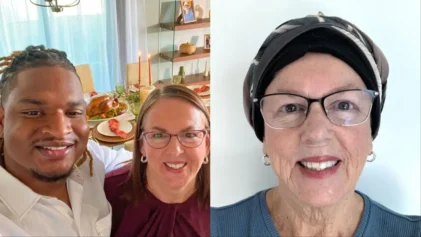A New York Police Department recently settled with a Black woman who sued the department after she was shackled while she gave birth in 2018.
The woman’s attorneys announced last month that a U.S. district magistrate judge approved a $750,000 settlement for the young mother of two.
NYPD cops bound the woman’s hands and ankles for hours at various points during her labor, and refused to unshackle her even after doctors pleaded for them to remove the cuffs. The officers claimed it was department policy to keep her restrained despite a state law on the books since 2009 that essentially outlawed pregnant women being shackled during childbirth.
The woman anonymously filed a lawsuit against New York City and several NYPD officers in October 2020, alleging police violated her civil rights by cuffing her to a hospital bed during labor. The woman, now 22, has not been publicly identified. She was listed as “Jane Doe” in her lawsuit to protect her anonymity.
She was represented by the Legal Aid Society, a nonprofit advocacy group based in the Big Apple that provides legal representation for criminal and civil cases.
As part of the settlement agreement, NYPD agreed to begin “roll call” training, a move to instruct all officers on the department’s policies on use of restraints for pregnant women during daily briefings at the start of their shifts. Neither the city nor police department admitted to any wrongdoing or violation of the woman’s rights in the settlement, CNN reported.
Legal Aid Society announced the agreement April 22, three days after a judge approved the settlement. Anne Oredeko, an attorney for the Legal Aid Society’s Racial Justice Unit, told Atlanta Black Star she was happy she and her team were able to negotiate a settlement for the woman and her son. But she remained concerned about other pregnant women who have encounters with New York police in the future.
“I think that part of this is somewhat bittersweet,” Oredeko said. “Although she was able to get a settlement that will definitely help her and her family, I have really very little expectation that this won’t happen again in New York City. The NYPD needs to change their pattern of interacting with communities, especially Black communities and Latinx communities. And they don’t really seem to have the will to change.”
Jane Doe was arrested on a misdemeanor assault charge Dec. 17, 2018, two days past her due date. She was more than 40 weeks pregnant when police took her into custody and booked her into jail at a Brooklyn police precinct. Months later, the charge was dismissed and a judge sealed the record of her arrest, according to her attorneys.
Jane Doe went into labor the day of her arrest. She was in a holding cell when her water broke. Oredeko said cops in the police station ignored her cries for help as she had contractions inside the holding cell for hours. Another prisoner in the jail cell had to assist the woman keep track of how far apart her contractions were. She was left to languish until a female officer finally arrived and got her medical attention. But that didn’t come until after the policewoman forced Jane Doe to lay on a bench in the holding cell so she could inspect her vagina to make sure she was indeed in the throes of labor.
She was cuffed to a gurney and rushed via ambulance to a hospital in a different part of the city, according to her lawsuit. At least one delivery room nurse asked police to remove the shackles. An officer claimed he couldn’t, citing an unspecified NYPD policy.
The officer finally relented and took the cuffs off Jane Doe after nurses told him the woman needed to begin pushing and the restraints were interfering with them giving her an epidural. Shortly after the cuffs were taken off, the woman’s baby was born.
“I mean, the nurses had to beg for them to at least remove the handcuffs so they could give her an epidural and for her to actually be able to give birth to her child,” Oredeko said. “It’s pretty egregious what happened to her. Our client experienced something really traumatic, and the level of cruelty involved with the officers who chose to put her through that really stood out. But sadly this case, although it was egregious, it’s not the only time the NYPD has done this type of behavior. It’s common practice for them to shackle people, not just when they’re in labor, but when they’re receiving medical treatment of any kind.”
Jane Doe was ultimately forced to give birth without the presence of her newborn son’s father, her family or the doctor who’d overseen her prenatal care.
“That was not my birth plan. I felt like a failure to my unborn because that wasn’t something that was planned for neither of us,” Jane Doe told CNN during an interview in which she spoke on condition of anonymity. “I just didn’t feel like myself anymore after that. I feel like my memory got taken away. And still I’m in pain.”
“She’s a mother who cares deeply about the well-being of her children,” Oredeko said. “She had a birthing plan, she had a hospital that she was working with. She had all of these things, and that was all thrown out the window. And she experienced one of the most violent ways to ever bring a child into this world.
Just an hour after birth, police handcuffed her again. She struggled to breastfeed the child; both she and the baby developed fever.
The distressed newborn had to receive special treatments at the hospital’s neonatal intensive care unit after he came down with a case of jaundice, the woman’s lawsuit indicated. It wasn’t until the following day, after she had a video arraignment from her hospital bed that officers finally unshackled Jane Doe for good. She and her son were discharged the following day.
“My only support was the nurse that was helping me,” she recollected the experience to CNN. “Nobody — not my family, not my friends — just complete strangers.”
NYPD officials declined to comment on the settlement or the incident.
In the federal lawsuit, Oredeko pointed to a similar case of another pregnant woman New York City police handcuffed while she was in labor. That incident happened in February 2018 and the city settled the Bronx woman’s case in July 2019, agreeing to pay her $610,000. City officials pledged to make changes to the policy handbook used by patrol officers in the NYPD. The goal of the reforms was to provide better care for women arrested in late stages of pregnancy.
A new version of the NYPD Patrol Guide issued last summer instructs officers to restrain pregnant women “in the least restrictive manner possible,” if at all, and to never handcuff a woman in custody while she’s in labor.
Kimberly Joyce, senior counsel for the New York City Law Department, told CNN the NYPD Patrol Guide was revamped in early 2020, after Jane Doe’s 2018 ordeal happened. She said parties in the anonymous Brooklyn woman’s case helped NYPD revise their training for officers.
But New York state legislators passed an amendment in 2015 that expanded anti-shackling prohibitions for pregnant woman to include the eight-week period after giving birth while women are recovering. The Empire State Assembly had already approved a law in 2009 dictating that “no restraints of any kind shall be used” on a pregnant woman while she’s being transported to a hospital, being admitted to the medical facility where she will have her baby, or while she’s in labor. Pregnant women in labor can only be restrained in extraordinary situations to keep them from harming themselves or others. And even then, according to the state law, only one wrist can be cuffed in front of the woman’s body.
“Our intent with S.983-A was to protect pregnant New Yorkers, during and after labor, from the cruelty of shackles and restraints when in custody,” said state Sen. Brad Hoylman, who co-sponsored the measure. “I certainly hope NYPD leadership follows this law and its intent when making these decisions.”
Oredeko described Jane Doe as “resilient” but said her son should not have been born in such traumatic fashion.
“What she experienced is what many black people’s ancestors experienced on this land … when Black folks were enslaved,” she said. “That’s the type of treatment she got for something that got dismissed and sealed, for a dumb misdemeanor case. And she has to live with the knowledge that her baby’s first moments in this world were born through this violent act that the police forced her to endure.”


